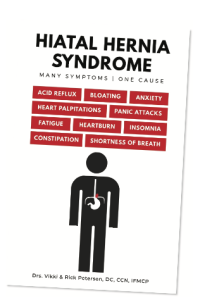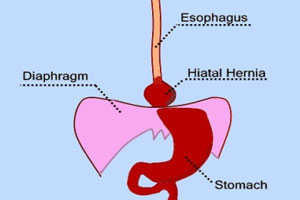Hiatal Hernia Symptoms: Is Anxiety Among Them?
Is Anxiety Among Hiatal Hernia Symptoms?
What you will learn about
The list of hiatal hernia symptoms keeps getting longer as anatomic pathology peels off layers of preconceived ideas and lack of knowledge. Hiatal hernia is a syndrome with many symptoms affecting multiple organ systems. Our own research has uncovered 20 common symptoms to Hiatal Hernia Syndrome, among which anxiety, panic attacks, heart palpitation and flutters.
All of them can be very concerning for the patient, and yet, most of the time, their root cause is completely missed by doctors. Here is a short video explaining why anxiety is among hiatal hernia symptoms.
Transcript of the video
I wanted to speak with you today about a source of anxiety that you probably don’t know about.
 This is my new book called Hiatal Hernia Syndrome. It will be out very soon probably middle of September [Publisher’s note: Dr. Vikki’s book is out and available on Amazon]. So, you’re getting a little sneak preview.
This is my new book called Hiatal Hernia Syndrome. It will be out very soon probably middle of September [Publisher’s note: Dr. Vikki’s book is out and available on Amazon]. So, you’re getting a little sneak preview.
But first of all, what does hiatal hernia mean? A hiatus is simply a hole or an opening, and a hernia is when something comes up or out of a hole that it shouldn’t.
You might have heard of “inguinal hernias” or “abdominal hernias”. All of that is a part of your body coming through an opening that it shouldn’t. With a hiatal hernia, we’re talking about your stomach.
A little anatomy
You have your mouth, and it’s connected via a tube to your stomach. My fist is going to represent the stomach. Just above the stomach is your diaphragm, which is a sheet of muscle that’s very, very strong.
And there’s an opening in that diaphragm, which is how that esophagus, that tube connects to your stomach.

What should happen is that stomach should be nicely below the diaphragm because your diaphragm has to move: every time you inhale, it goes down; every time you exhale, it pushes up. You have to have that freedom of motion for the diaphragm. Whether you’re just sitting as I am now, or you’re exercising, it has to be able to push enough air in and out comfortably.
What happens with the hiatal hernia, once again, is that stomach is pushed up on the diaphragm… and sometimes above it. And it’s pushing up through the esophagus, and that classically creates acid reflux. [One of the most commonly recognized hiatal hernia symptoms].
Now, there are a lot of different variations of acid reflux. I met a young woman yesterday and she said, “I’m just a little uncomfortable in my chest“. I wouldn’t call it acid reflux or heartburn, but it can be subtle like that. She had the symptom we’re going to talk about today, which is anxiety.
So how does your stomach somehow create this mental symptom anxiety? Let’s look at that.
Anxiety, one of hiatal hernia symptoms
We kind of take breathing for granted, and it’s not something we can ever stop and survive for very long. Your body has a vested interest in you continuing to get enough oxygen and to breathe effectively.
With hiatal hernia, the diaphragm gets a little “frozen”. It’s not that it’s not moving at all. You’re still breathing, but not enough. And what happens is your body goes into what’s called a “sympathetic reaction” or a “fight or flight reaction”: it’s trying to say to you “I don’t know what’s going on, but you’re not getting enough oxygen. It’s stressing us out, and we’re going to pump stress hormones. We’re going to pump adrenaline and cortisol, and we’re going to make your heart beat faster to try to get more oxygenated blood.”
And it’s doing all these things actually as a protective mechanism. But for you, getting this surge of stress hormones, you start to feel anxious because your body is saying “stress, stress, stress”.
And then you’re looking around in your environment. You don’t see a source of obvious stress. It’s all coming from within. But that feeling of anxiety, or impending doom, or an outright panic attack because of the heart palpitations and sometimes a perceived shortness of breath… What happens is anxiety.
And this especially happens a lot of times in the middle of the night. It’s not exclusively, but you’re horizontal in the middle of the night: gravity isn’t helping to pull that stomach down and give that diaphragm some more motion.
 This young lady I saw yesterday, she said: “You know, I’ll just really lean back and try to give my torso more room because I’m not getting enough air“. So she definitely perceived she wasn’t getting enough air, and she’s perceiving this anxiety worse at night, but nobody’s giving her any solutions [because anxiety is not commonly seen as one of hiatal hernia symptoms].
This young lady I saw yesterday, she said: “You know, I’ll just really lean back and try to give my torso more room because I’m not getting enough air“. So she definitely perceived she wasn’t getting enough air, and she’s perceiving this anxiety worse at night, but nobody’s giving her any solutions [because anxiety is not commonly seen as one of hiatal hernia symptoms].
If you run to an ER in the middle of the night with heart palpitations and shortness of breath and a full-on panic attack, they’ll check your heart, make sure you’re not having a heart attack, and check your lungs. And then they’ll tell you, “You are just having a panic attack. Here’s your antidepressant.”
Anti-anxiety medications are very dangerous. They have very scary side effects as far as suicidal tendencies. And this is of course not an answer.
Going to the root cause
The name of our clinic is Root Cause Medical Clinic. We’re all about “What’s the real reason?“. Telling you “You have a mental problem” when it’s actually a physical diaphragm-stomach problem… that couldn’t be farther, farther apart. Not to mention this dangerous drug that you’ve been prescribed and now you think you have a mental condition when you don’t.
Hopefully I’ve described the mechanism well enough.
I can’t tell you how often I run into patients with this problem. Whether it’s on my YouTube channel and people reaching out from all over the world, or patients I meet and I’m at two new patients yesterday, both young in good shape. You look at them, they look the picture of health. Yet they’re both having an anxiety and they don’t get it. They’re like “I don’t know. I’ve never been an anxious person before, I don’t understand“.
I hope this explained it well. Please consider reaching out to us for consultation because your next question can be: “Okay, that’s nice, I get the mechanism. How do I fix it?” The good news is it is completely fixable and it’s natural, no drugs or surgery, but it is digestive related. Sometimes that spasm of the diaphragm has been happening for a long time. Our clinic has physical therapy and chiropractic for the structural end of things. And we have medical doctors, functional medicine doctors, nurse practitioners, registered dieticians. We also do nutritional IVs.
Everybody gets to the place they are at with this condition a little differently, but again, the root cause is not hard to fix, and it can be fully fixed. I really wanted you to know that, because so many people are suffering needlessly and being told “this is all in your head”, but that’s just not true”. I hope that video helped to explain it.
Consulting in person or by telehealth
 Root Cause Medical Clinic is located in downtown Clearwater, FL, at the corner of S. Ft Harrison and Magnolia. If you come for a consultation or treatment, we have plenty of parking space. That won’t be a problem.
Root Cause Medical Clinic is located in downtown Clearwater, FL, at the corner of S. Ft Harrison and Magnolia. If you come for a consultation or treatment, we have plenty of parking space. That won’t be a problem.
If you prefer to use telemedicine and receive an online consultation, we offer telehealth services in several states. Please call our offices for details and to schedule a time for your medical consultation.
Additional resources:
Why should you seek treatment with the root cause in mind?
Where in your body can you feel hiatal hernia symptoms?
Ask a Doctor
Have a health concern you'd like to speak with a doctor about? Or just want clarity on a subject? Ask Us!






